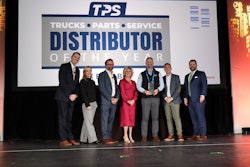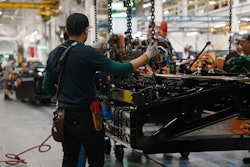Heavy-duty truck repair is becoming increasingly high-tech and it sometimes may seem like a technician must perform his job with a surgeon’s delicacy.
Before we get ahead of ourselves, it’s important not to knock a technician’s toolbox off its well-earned pedestal. A toolbox holds the tools a technician gathers as he travels the learning curve. In a sense, the toolbox reflects the skill level, specialty and even personality of its owner.
Leland Long, manager of fleet services, Southeastern Freight Lines, Inc., West Columbia, SC, Dale Phillips, maintenance supervisor, Southeastern Freight Lines, Inc., Suwanee, GA, and Randy Davis, maintenance supervisor, Southeastern Freight Lines, Inc., Greenville, SC, consulted with one another as well as with some of their technicians and provided Truck Parts & Service with guidelines for technicians filling their toolboxes.
The first recommendation these experts provided was that an entry-level technician seek a toolbox that can be expanded as he grows into the job. Spending money to buy all tools at once can result ultimately in wasted time and money.
“Younger technicians tend to spend more on tools than seasoned technicians. A journeyman will spend on an as-needed basis since his box is well-supplied,” Long said. The experts also suggested that entry-level technicians consult with their more seasoned co-workers before spending money on tools they may not be able to cost justify.
For beginning technicians, the experts recommend taking advantage of resources available at tech schools or vocational programs. The schools often have established reliable contacts at various tool companies and therefore can secure a discount for a beginning technician building a toolbox.
Also, before spending money, technicians should check to see what their shops supply for them, such as safety glasses or goggles, ear protection, a good pair of gloves and steel-toed shoes.
“Most shops will have all the specialty tools that the new technician will need. After a short time, the technician will figure out what he needs to add to his toolbox to work on the specific equipment the company operates,” Long explained.
Even more experienced technicians should find reliable suppliers from whom to buy. “Every technician needs to find a good tool supplier, whether it be a truck that comes to him or a local vendor from whom he can get meters, torque wrenches and other tools and tool repair work completed as soon as possible,” Long said.
When selecting tools, it’s important to make sure that beyond getting the job done and done right, they carry some type of warranty and that they are designed and crafted to keep you safe.
We all are familiar with the exorbitant cost of truck downtime for owner/operators and fleets, and technicians should think of their own downtime caused by workplace injury resulting from cheap or poorly functioning tools as equally costly, if not disastrous to personal health.
The Southeastern Freight Lines experts compiled the following recommended tool list for technicians. Some of the tools are:
- An assortment of screwdrivers, pliers, a chisel set, steel and dead blow hammers and wiring pliers; with the prevalence of electronics, a good pair of crimpers for wire ends as well as wire end removal tools are necessities.
- Basic hand tools, such as end wrenches in sizes /” to about 11/2″.
- A Torx /” drive socket set, an allen head socket set and a /” drive metric socket set
- Socket sets from 1/2″ drive (chrome and impact) up to 11/2″
- A digital volt-ohm meter
- Impact wrenches 3/8″ and 1/2″ drive
- A die grinder
- A drill
Specialty tools that may be needed are:
- A ratchet head wrench set
- A flex head wrench set
- /”, 3/8″ and 1/2″ drive torque wrench
Stocking a toolbox is almost a rite of passage for technicians. Long explained that one often finds homemade tools in a toolbox. “These are made by the technician to simplify oddities in a fleet.”
A technician needs to find the appropriate toolbox in which to house his valuable collection of tools.
“Toolboxes are as diversified as individuals. Most technicians like the large roll-around chest with a work area on top. Others get the roll-around and top chest.
“Trainees or apprentices will not need as big a box as a journeyman at first because they can upsize as needed,” Long said.
A technician should keep in mind that it’s better to under-buy at first, then to slowly build his tools as needed. Also, go for quality over quantity.
Long concluded, “What it all boils down to is bragging rights to who has the biggest and best in the shop.” Just remember, slow and steady wins the race.
Editor’s Note: Truck Parts & Service magazine would like to thank the Technology & Maintenance Council for its help with this article.







